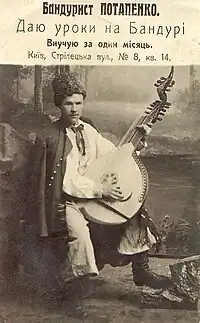бандура
Russian
Pronunciation
- IPA(key): [bɐnˈdurə]
Audio (file)
Noun
банду́ра • (bandúra) f inan (genitive банду́ры, nominative plural банду́ры, genitive plural банду́р)
- bandura (old Ukrainian music instrument)
- (colloquial, derogatory) a large, bulky object
Declension
| singular | plural | |
|---|---|---|
| nominative | банду́ра bandúra |
банду́ры bandúry |
| genitive | банду́ры bandúry |
банду́р bandúr |
| dative | банду́ре bandúre |
банду́рам bandúram |
| accusative | банду́ру bandúru |
банду́ры bandúry |
| instrumental | банду́рой, банду́рою bandúroj, bandúroju |
банду́рами bandúrami |
| prepositional | банду́ре bandúre |
банду́рах bandúrax |
Related terms
- бандури́ст (banduríst)
Ukrainian

бандура
Pronunciation
- IPA(key): [bɐnˈdurɐ]
(file)
Etymology 1
Possibly through Italian pandura and Polish pandura, from Late Latin pandura (“musical instrument with three strings”); ultimately from Ancient Greek πανδοῦρα (pandoûra, “three-stringed lute; zither”). Doublet of ба́нджо (bándžo) and мандо́ла (mandóla).
Noun
банду́ра • (bandúra) f inan (genitive банду́ри, nominative plural банду́ри, genitive plural банду́р, diminutive банду́рка or банду́рочка or банду́ронька)
- (music) bandura (old Ukrainian music instrument)
- (dialectal, colloquial, derogatory) a large, bulky object
Declension
Declension of банду́ра (inan hard fem-form accent-a)
| singular | plural | |
|---|---|---|
| nominative | банду́ра bandúra |
банду́ри bandúry |
| genitive | банду́ри bandúry |
банду́р bandúr |
| dative | банду́рі bandúri |
банду́рам bandúram |
| accusative | банду́ру bandúru |
банду́ри bandúry |
| instrumental | банду́рою bandúroju |
банду́рами bandúramy |
| locative | банду́рі bandúri |
банду́рах bandúrax |
| vocative | банду́ро bandúro |
банду́ри bandúry |
Related terms
- бандури́ст (bandurýst)
Etymology 2
From Polish bandurki and Slovak bandurka, related to German Brandenburg.
Noun
банду́ра • (bandúra) f inan (genitive банду́ри, nominative plural банду́ри, genitive plural банду́р, diminutive банду́рка)
- (dialectal) potato
Declension
Declension of банду́ра (inan hard fem-form accent-a)
| singular | plural | |
|---|---|---|
| nominative | банду́ра bandúra |
банду́ри bandúry |
| genitive | банду́ри bandúry |
банду́р bandúr |
| dative | банду́рі bandúri |
банду́рам bandúram |
| accusative | банду́ру bandúru |
банду́ри bandúry |
| instrumental | банду́рою bandúroju |
банду́рами bandúramy |
| locative | банду́рі bandúri |
банду́рах bandúrax |
| vocative | банду́ро bandúro |
банду́ри bandúry |
Derived terms
- бандурча́ник (bandurčányk)
- бандурча́нка (bandurčánka)
- бандурчина (bandurčyna)
- бандуря́нка (bandurjánka)
- бандуря́та (bandurjáta)
Further reading
- Melnychuk, O. S., editor (1982), “бандура”, in Етимологічний словник української мови [Etymological Dictionary of the Ukrainian Language] (in Ukrainian), volumes 1 (А – Г), Kyiv: Naukova Dumka, page 133
- Hrinchenko, Borys, editor (1907–1909), “банду́ра”, in Словарь украинского языка [Dictionary of the Ukrainian Language] (in Russian), Kyiv: Kievskaya starina
- Bilodid, I. K., editor (1970–1980), “бандура”, in Словник української мови: в 11 т. [Dictionary of the Ukrainian Language: in 11 vols] (in Ukrainian), Kyiv: Naukova Dumka
- Rusanivskyi, V. M., editor (2010), “банду́ра”, in Словник української мови: у 20 т. [Dictionary of the Ukrainian Language: in 20 vols] (in Ukrainian), volumes 1 (а – бязь), Kyiv: Naukova Dumka, →ISBN
This article is issued from Wiktionary. The text is licensed under Creative Commons - Attribution - Sharealike. Additional terms may apply for the media files.